Tan Kin Lian: From leaving school and supporting his family to representing 'ordinary people'
A man who loves Sudoku and puzzles, former NTUC Income chief Tan Kin Lian believes he can connect with ordinary Singaporeans. CNA speaks to him about the decision to run for president 12 years after his first bid.
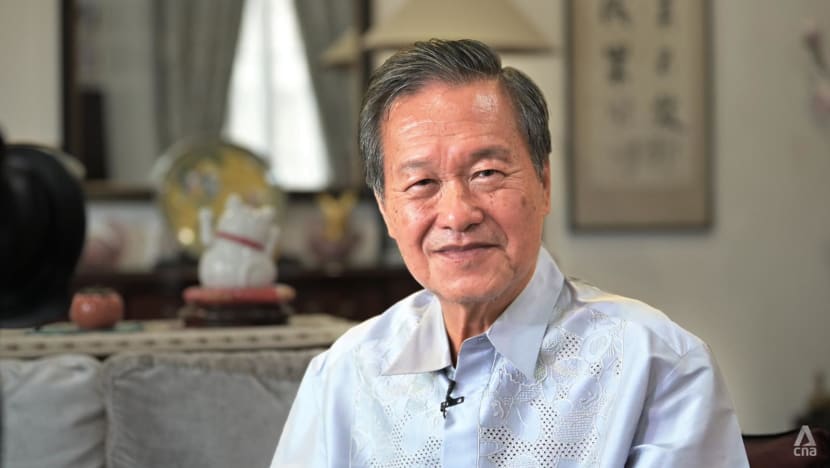
Presidential candidate Tan Kin Lian at his home. (Photo: CNA/Raydza Rahman)
SINGAPORE: When Mr Tan Kin Lian left school after Secondary 4 in 1965, it was a decision he made out of necessity.
His father had lost his job, and Mr Tan wanted to step up and help support his family.
“My classmates were very surprised (about) why I came out to work. Even the principal (who was) a very kind man, called me and said: ‘Kin Lian, if you have financial hardship, we can give you a bursary so that we can pay your school fees,’” recalled Mr Tan, who said he was one of Raffles Institution's top students.
“But a bursary was not enough because my family needed a monthly income.”
Born into a poor family with six children, Mr Tan lived in various rental homes when he was young. His family moved seven or eight times before eventually buying an HDB flat in Marine Parade.
“We didn't have too many things to move around so we got a lorry and put in a few chairs and cupboards ... Not too difficult, so it was quite a good adventure," said Mr Tan in an interview with CNA at his home earlier this month.
"I'm very familiar with many parts of Singapore because I moved from place to place."
“The difficulties and challenges in his early years ... strengthened Kin Lian’s character and personality considerably,” said Mr Tan’s brother Albert at a presidential campaign rally in 2011. “They also gave him a deep appreciation of the difficulties of the ordinary people.”
And it is the "ordinary people" that Mr Tan hopes to connect with as he campaigns to become President.
This, he believes, will work in his favour. “They know me as an ordinary person, like they are," he said.
Mr Tan, a former NTUC Income chief executive, is one of three candidates standing in the Presidential Election, alongside former Senior Minister Tharman Shanmugaratnam and former GIC chief investment officer Ng Kok Song.
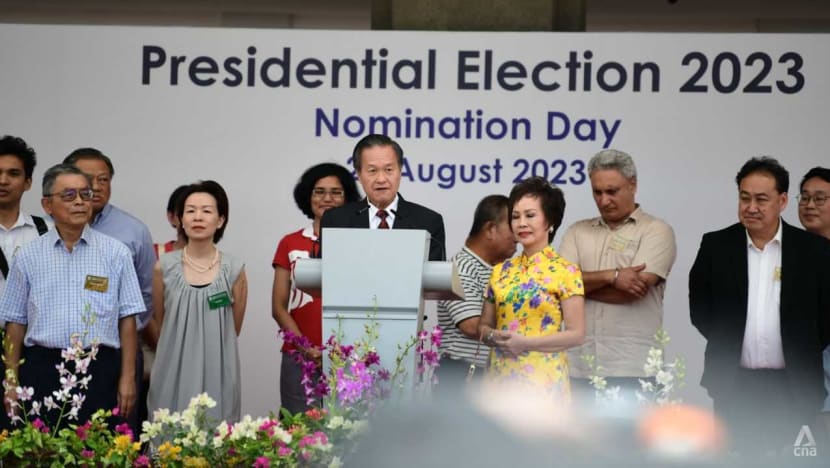
“The ordinary Singaporean, they like me ... When I went to the hawker centres and trains (for walkabouts), three-quarters of the people knew me," said Mr Tan.
"I am quite proud that many people know me, and I think that is my value to the country.”
ENCOURAGING FRUGALITY
In his first job as a clerk at an insurance company, Mr Tan earned S$180 (US$130) a month. He eventually became an insurance actuary and joined NTUC Income, which started off as a cooperative in 1970, providing life insurance to the working masses.
With a background in computer programming, Mr Tan said he introduced a computer system. This became the "backbone" for the company's success, he added.
From general manager, he rose through the ranks to become the CEO for 30 years until 2007.
"I am very proud of the team of coworkers. Most of them worked with me for many years," said Mr Tan.
"These are not the 'top flyers', these are ordinary workers. But I'm able to find a way to make them very productive. Everybody has certain skills and if you give them the right job to do, they grow and they enjoy their work. The dedication of my colleagues was wonderful."
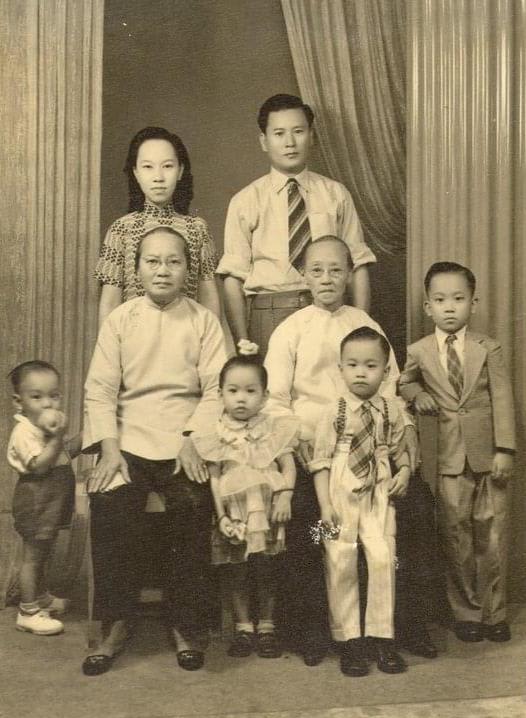
Mr Tan said his key contribution during his time at NTUC Income was running the company efficiently and at low cost.
“Frugality is something I encourage; you cannot say this is (the) company's money. If the company has got too much money, pay the workers more.”
He recalled how he refused to fly business or first class even on long-distance flights because tickets simply cost "too much".
"When you are going to fly long distance, the air ticket is one month of salary. It is too much. So therefore, I flew economy most of the time," he said. "When the company grew to be bigger, (and) more able to afford (it), I still continued to be quite frugal. Sometimes I flew business class, but never first class."
After three decades in the role, Mr Tan said that a “difference in goals” resulted in him leaving the company. “At that time, the board of directors wanted Income to be more business-like, and I was more ‘cooperative’,” he said.
After leaving the insurer, Mr Tan, who was by then “more or less” semi-retired, started a computer software business and travelled once a month to Indonesia to provide insurance consultancy services.
A PAINFUL LOSS
Then came 2011, the year Mr Tan decided to run for President.
“I thought I might be able to make a difference to influence the government on how to run the country a bit differently,” he said.
At a rally that year, Mr Tan’s daughter Tan Su Ling described her father, who spoke up for investors who had lost their money investing in Lehman Brothers’ minibond products, as a “man of courage”.
Among the actions he took in 2008 was starting a petition to bring together investors affected by the collapse of the investment bank to explore how to take collective action to recover their losses. He also organised an event at Speakers' Corner in Hong Lim Park where he addressed a crowd of around 500 angry investors, offering guidance and suggestions of what they could do.
"He is not afraid to speak up or make decisions on issues that he believes in, even though they may be unpopular," she added.
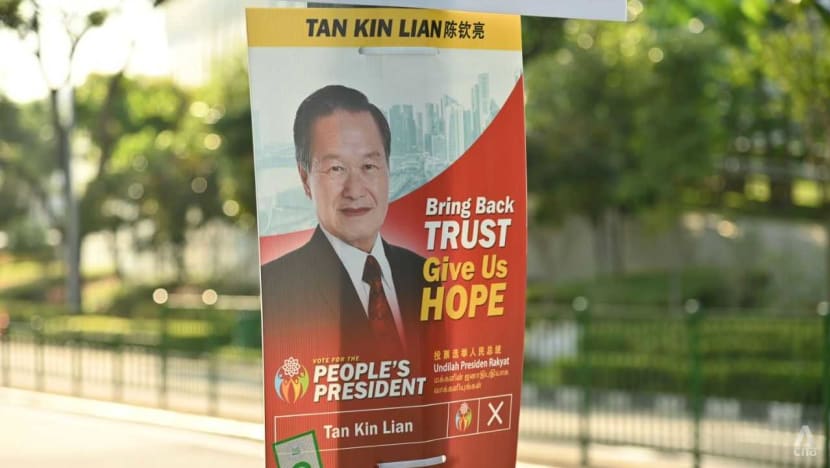
But in the election, Mr Tan came in last out of four candidates, with 4.91 per cent of the more than 2.2 million votes. He lost his deposit of S$48,000.
It came as a “big shock” that he had garnered such a low percentage of votes, he said.
“I didn’t expect to get so low a (share of the) vote. That’s because the non-establishment votes were split … other candidates who are non-establishment took away most of the votes,” Mr Tan told CNA.
“The contest very much depended upon politics, who is able to mobilise the most people and get the most attention.”
Losing his deposit was “painful”, admitted Mr Tan, but he said that was “not so important”.
“It was a big disappointment for me, but I got over that. I never regretted, I learnt from what I went through,” he said. "Regret(s) are for people who have big ego(s), they think that they are very important. To me, no, that's past. We look forward."
However, the result took a toll on his family, Mr Tan admitted.
“They had a very difficult time, because they had friends and some of the friends were quite malicious (who) would ridicule them, and they felt rather bad,” he recalled.
“This also affected me. Over the years I got quite a number of people who ridicule me. They keep on saying that I lost my deposit. It is very rude, it is unnecessary.”
During his 2011 presidential campaign, Mr Tan handed out mini-puzzles during his walkabouts. Each puzzle consisted of four pieces of plastic, which one could use to form an assortment of shapes.
“I believe in developing the mind, and (learning) how to solve problems by thinking out of the box. These puzzles do help people to think," said Mr Tan, who also distributed his Sudoku books.
He didn't manage to distribute them all, but 12 years later, is getting a second chance to do so.
'LIKE A DUTY'
It is fate that has drawn him to this path again, Mr Tan believes.
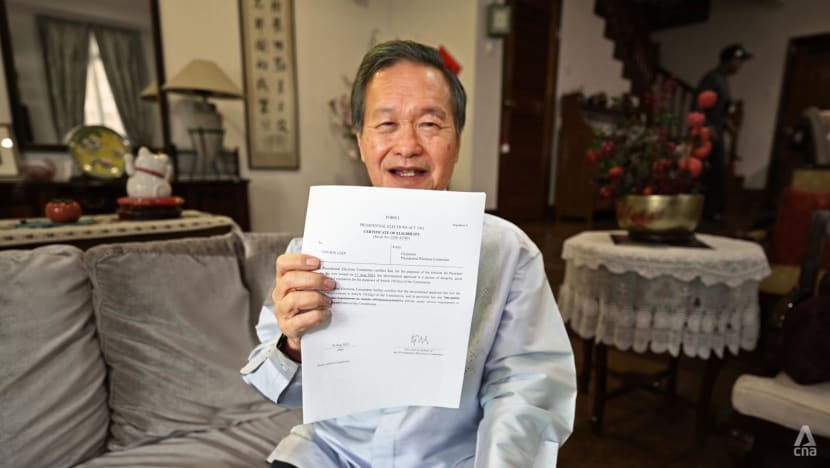
He initially had not planned on stepping forward but decided to do so when it became "quite clear" to him that Mr George Goh, who he had previously described as an "independent person", would not qualify.
"I believe that the people of Singapore deserve the chance to vote for an independent candidate," he added.
Before his eligibility was confirmed, Mr Tan also said he would step aside if Mr Goh qualified as he did not want to split the votes of Singaporeans who prefer such a candidate.
“He (George Goh) was clearly a stronger candidate, with his resources and being a bit younger,” said Mr Tan. “But somehow I think ... fate just decided that I should be the one to carry the flag of the independent choice.”
His experience from 2011 had taught him the importance of not splitting the “non-establishment vote”, said Mr Tan.
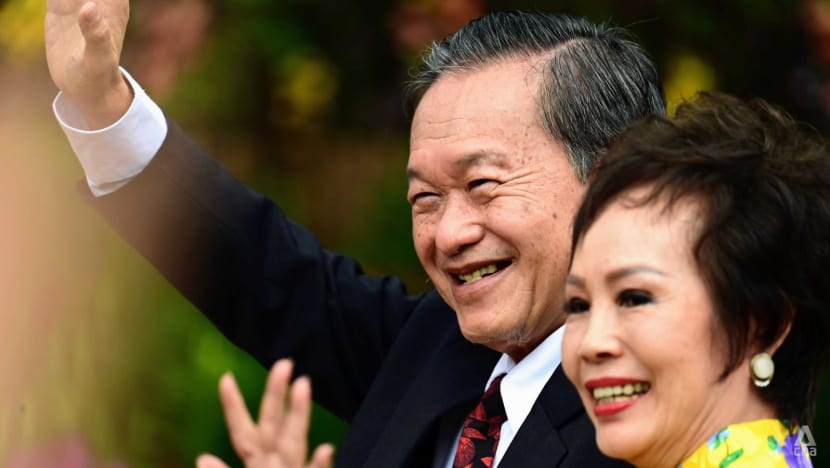
Speaking to the media earlier this month, Mr Tan said he was "very confident" that his performance would be different from the 2011 Presidential Election.
"2011 was not my time. 2023 will be my time," he said. "The (conditions) in 2023 are more favourable to me because many people are struggling with high cost of living, high cost of housing, and also uncertainty of jobs."
But not everybody agrees with his assessment of his chances.
"My family members think I have no chance against Tharman. I disagree with them. I think I have a good chance against Tharman," said Mr Tan.
"They don't want to go through the trauma again after 2011 ... I told them this time they don't need to be involved. They should carry on (with) their lives and I will be the only one who will campaign."
Mr Tan is clear on why he is running for President.
“It is for the country, it is for the people,” he said. “I believe that it is like a duty.”
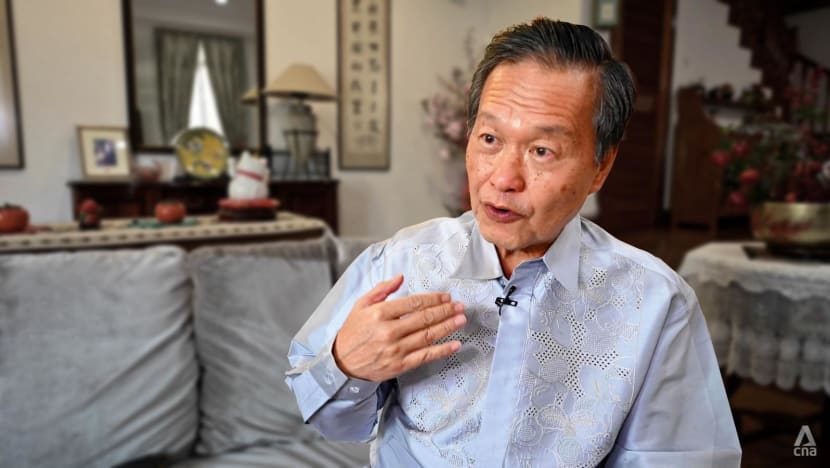
Mr Tan is best known by many for his posts on Facebook, and often posts multiple times a day. It is the main platform which the 75-year-old uses.
More than 64,000 accounts follow Mr Tan on his Facebook page, where he regularly shares life updates, such as the food he eats. He also posts his thoughts about various issues, from the cost of living to cybersecurity.
“I enjoy communicating with people and getting their reactions,” said Mr Tan, who pointed out that some of his posts have reached more than 100,000 people. “I use light-hearted material to attract large numbers of people, in the process, they get to know me, and they get to know that I’m taking part in the election. I think it will be very favourable.”
Some of Mr Tan’s posts however, have drawn ire.
Over the weekend, a TikTok video went viral that compiled several of his posts which talk about “pretty” girls.
In response, Mr Tan said a "small minority" of people are uncomfortable with his social media posts that talk about "pretty" girls, and that most people find it "quite fun".
Later on Monday, the Association of Women for Action and Research (AWARE) said it shares the public's concerns that Mr Tan has been cleared to run in the Presidential Election given his "history of objectifying women".
Other past Facebook posts have drawn bewilderment. In 2019, Mr Tan published his NRIC number and personal details on his Facebook page while trying to prove his point that “paranoia” over the privacy of NRIC and contact details was overblown.
“No regrets (on that post) ... Of course, I got people who abused that – they sent me messages and I know how to ignore them,” said Mr Tan, who spoke to CNA days before the controversy emerged about his "pretty girl" comments.
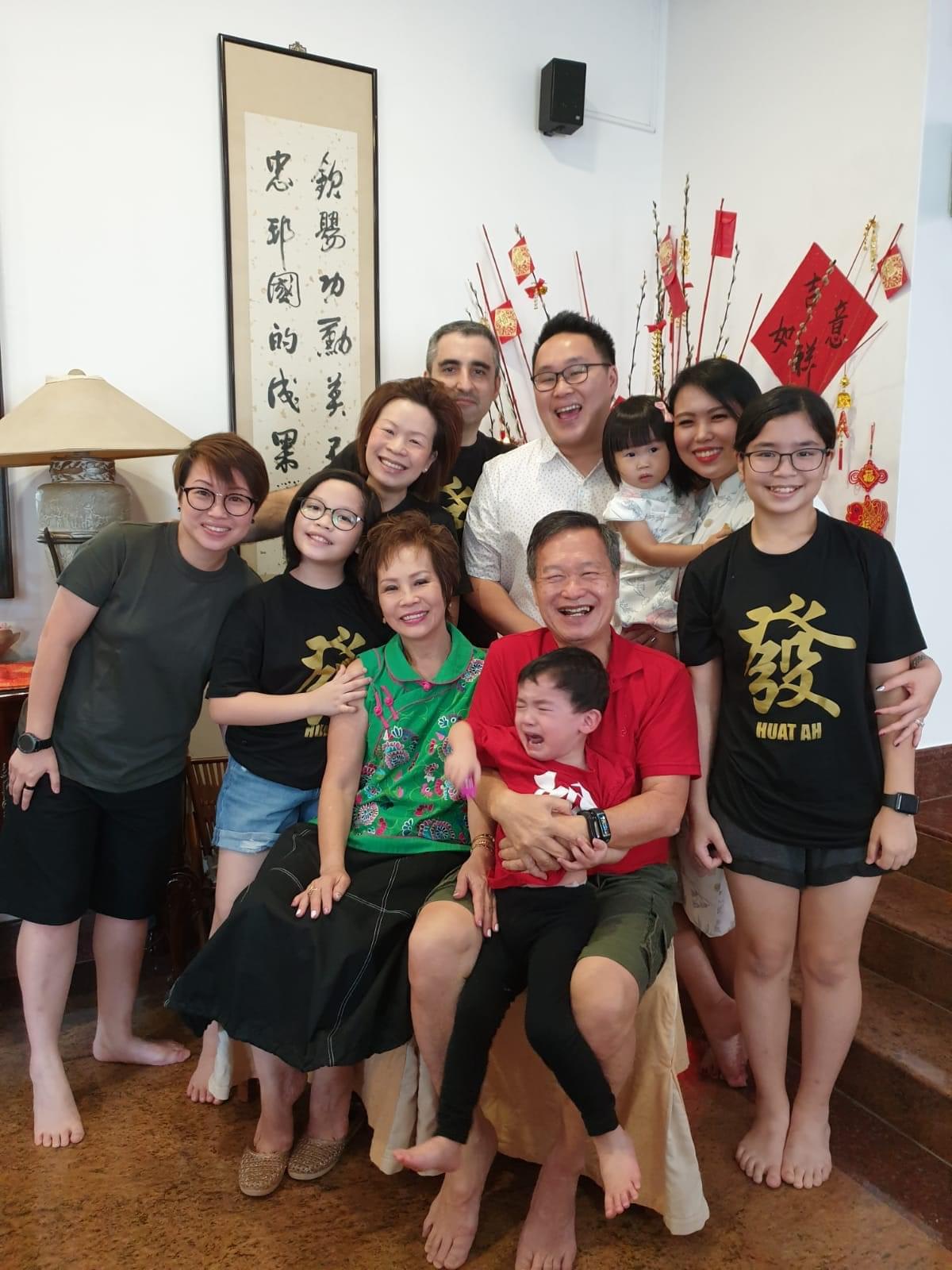
Asked if he would change the way he posts on social media if he is elected President, Mr Tan said yes. However, he also said he disagrees with critics who point out that the President needs to behave in a particular way.
“If the critics were to come and say: ‘Mr Tan is just not presidential’, that’s your view,” said Mr Tan. “I’ve got other people who say … Kin Lian, be ordinary, that’s where you can better reach the people.”
And that, Mr Tan believes, is his selling point – that others can relate to him.
“If fate determines that I should win, then I will do my duty to achieve the goal – to make life better for Singaporeans,” said Mr Tan.
“And if I don’t win … I will enjoy my retirement years.”
This is the last in CNA's series of interviews with each of the candidates running in Singapore's Presidential Election. The interview with Ng Kok Song was published on Aug 23 and the interview with Tharman Shanmugaratnam on Aug 24.

















